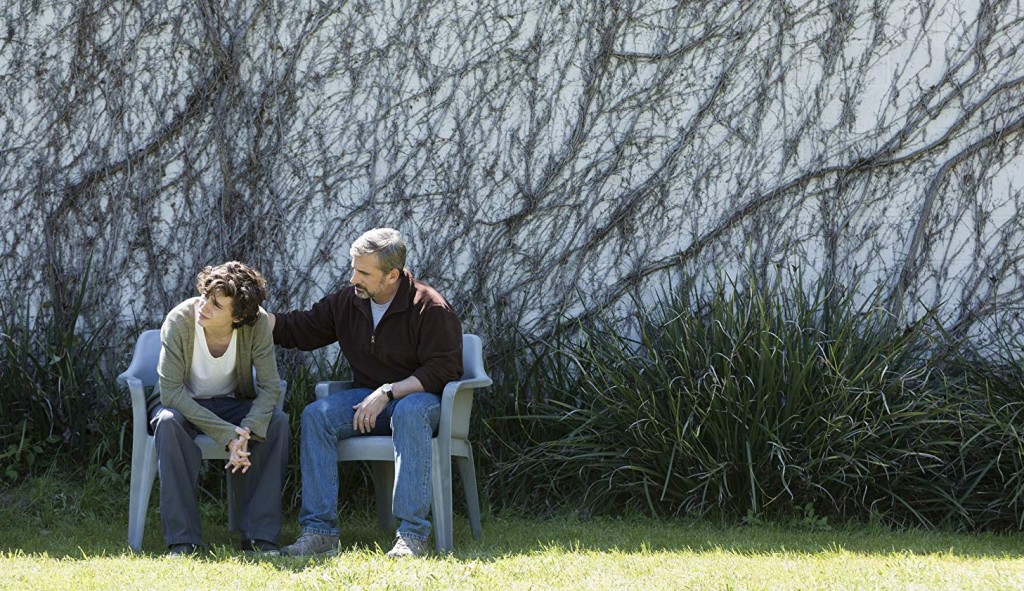We have seen many films about addiction, but Beautiful Boy is really a film about fatherhood, about that desperate sensation of wanting to help a loved one and not knowing how. It is the real-life story of David Sheff (Steve Carell), an American journalist, and his son Nic (Timothee Chalamet), who gets addicted to crystal meth at a very young age.
I applaud Beautiful Boy for not even attempting to explain Nic’s addiction, by linking it to one specific trauma or any other easily identifiable cause: many people try some types of drugs throughout their lives, and some people grow addicted to them, and blaming it on one evil dealer or one fateful night is oversimplifying it. Crucially, we see him relapse or overdose after some recovery, and again this is not due to any external event: it is the insidiousness of the condition and why it’s so difficult to fight.
By looking at Nic from David’s perspective, we see him with immense sympathy and tenderness, not devoid of frustration as he squanders one opportunity after another. Steve Carrell gives a nuanced performance as an increasingly lost father trying to navigate a dangerous situation where all the choices are wrong. Seeing him very slowly arriving at the realization that sometimes there is nothing you can do to help someone is affecting. Chalamet is also brilliant, rail-thin and anguished as poor Nic, delving into his anxiety but refraining from exaggerated tweaker mannerisms. If anything, I only wish they had more scenes together.
The movie jumps from past to present, which works, I think, to deconstruct our view of addiction as a linear story with a beginning and an end, and present it instead as an ongoing condition. It also alternates between David’s and Nic’s perspective, a bit too much perhaps; if I had Timothee Chalamet in my movie, I would also want to profit from his seemingly innate talent as much as possible, but ultimately this is his father’s story and taking the focus away from him ends up making Beautiful Boy feel too long.
A last thought about the women in the movie: Maura Tierney, who plays David’s second wife with quiet strength, is a good example of how a character can be secondary, appear only to play off the protagonist, not have a separate arc, and still seem like a real person instead of just “The Wife Of”. On the other hand, the excellent Amy Ryan is completely wasted as Nic’s mother, with only a couple of scenes to hint that she is on the same journey as David.
In conclusion, even though Beautiful Boy’s irregular story made it feel long and perhaps not as impactful as it could have been, its two central performances and its understanding view of the family made it a worthy view for me.
Beautiful Boy (2018)
Hemos visto muchas películas sobre la adicción, pero Beautiful Boy en realidad es una película sobre la paternidad, sobre esa sensación desesperada de querer ayudar a un ser amado y no saber cómo. Es la historia real de David Sheff (Steve Carell), periodista estadounidense, y su hijo Nic (Timothee Chalamet), quien se engancha al cristal a una edad muy temprana.
Lo que admiro de Beautiful Boy es que nunca intenta explicar la adicción de Nic relacionándola con un trauma concreto o con alguna causa fácilmente identificable: mucha gente prueba algún tipo de droga a lo largo de su vida, algunas personas se vuelven adictas, y culpar un camello malvado o una fatídica noche es simplificar la situación. Es crucial que vemos a Nic sufrir recaídas tras un período de recuperación, y de nuevo esto no se debe a un acontecimiento externo: es el influjo de la condición y la razón por la que cuesta tanto combatirla.
Al ver a Nic desde la perspectiva de su padre, lo vemos con inmenso cariño y simpatía, no carentes de frustración a medida que desperdicia una oportunidad tras otra. Steve Carell ofrece una actuación sutil como padre cada vez más perdido que intenta manejar una situación en la que todas las respuestas son incorrectas. Verlo darse cuenta lentamente de que a veces no se puede ayudar a alguien es conmovedor. Chalamet también es brillante, flaco y angustiado como el pobre Nic, dando rienda suelta a su ansiedad pero sin caer en exagerados gestos de yonqui de película.
La historia salta del pasado al presente, lo que funciona, yo creo, para deconstruir nuestra visión de la adicción como una historia lineal con un principio y un final, y presentarla por el contrario como una condición permanente. También alterna entre la perspectiva de David y la de Nic, quizás demasiado; si contara con Timothee Chalamet en mi película, yo también querría explotar su talento aparentemente innato lo más posible, pero al fin y al cabo esta es la historia de su padre y alejarnos de él acaba haciendo que Beautiful Boy se haga larga.
Una última nota acerca de las mujeres del filme: Maura Tierney, quien interpreta con discreta fuerza a la segunda mujer de David, es un buen ejemplo de cómo un personaje puede ser secundario, aparecer solo para complementar al protagonista, no tener una historia propia, y aun así parecer una persona real y completa y no solamente “La Mujer De”. Por el contrario, la excelente Amy Ryan está totalmente desperdiciada como la madre de Nic, con solo un par de escenas para dejar vislumbrar que recorre el mismo camino que David.
En conclusión, aunque la historia irregular de Beautiful Boy la hace un poco larga y reduce tal vez el impacto que podría haber tenido, sus dos interpretaciones centrales y su mirada comprensiva hacen que merezca la pena.
